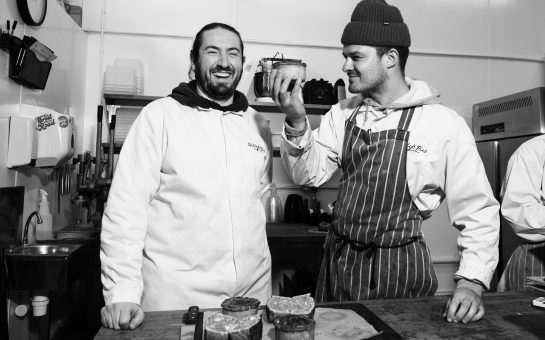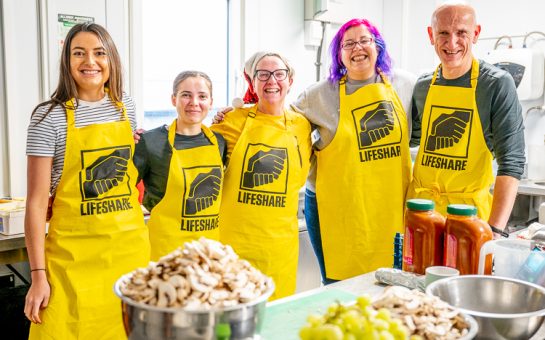The face of the British high street has rapidly developed within recent years, but despite the number of bookies, pound shops and greasy spoons that have popped up, traditional butchers have remained a customary feature.
In celebration of our meat eating ways, the Meat Trades Journal is running its eighth annual National Butchers week, which is between March 23-29.
The week will applaud the fact that butchers still remain the number one choice for service, knowledge and convenience when it comes to buying meat.
Lee Horsley Frost, director at W H Frost Butchers, explained to MM how coming from a line of butchers put him and his family a cut above the rest.
@MM_newsonline pic.twitter.com/LkdUkUHzAt
— LEE HORSLEY FROST (@frostybutcher) March 25, 2015
“My family have been butchers for four generations,” he explained.
“My great grandfather was a butcher my grandfather was a butcher, my father was a butcher and we were always involved in the business as kids.”
Lee, who runs the Chorlton based butchers with his five brothers, learned the ropes from an early age and though he insists that the trade was never forced upon himself and his brothers, they all intuitively followed suit.
Established in 1890 in Moss Side, the now Chorlton-cum-Hardy business prides itself on the level of expertise it provides for its customers, who range from local punters to national clients.
However for many years it looked like the butchering trade was in decline as supermarkets monopolised the food industry.
According to leading Meat Trades Journal and levy body Eblex, from the early 1990s through to the mid 2000s, butcher numbers tumbled from 15,000 to around 6,000 – a massive 60% drop.
A few prime forequarters for a very famous burger boy. https://t.co/AjFp16k4ul
— LEE HORSLEY FROST (@frostybutcher) March 25, 2015
Accordingly, many butchers like Lee feel that beefing up to big supermarket chains with events like National Butcher’s Week is a way of keeping his business alive.
He said: “We are passionate about keeping small independent family run businesses thriving and going because without them we’ve just got the supermarkets.
“Since the horse meat scandal good quality butchers are thriving.
“Our sales are up by 40% in the last three years and you also see other good quality butchers staying on the high street.”
With stringent checks from the European Food Standard Inspection Service and the food lovers becoming more health and food conscious after the 2013 horse meat scandal, Lee emphasised the importance of the training and experience needed to become a trusted butcher.
He said: “More people are concerned about where their food is from, If it’s locally sourced, free range and if it’s RCPCA monitored.
“You only get that from your quality local independent butcher.
“I don’t think you’ll see new butchers opening I just think you’ll see the ones that are here become even more successful.”
Two of you lucky buggers could be tucking into a @frostybutcher meat board with stuff like this on it. #fatloaf RT pic.twitter.com/GGnPULXdBL
— LEE HORSLEY FROST (@frostybutcher) March 25, 2015
With tradition having a stronghold on the trade, it seems that there is not much room for emerging talent in the industry.
However Lee explained that the level of expertise needed to build a trusted customer rapport was something that needed to be build over a number of years.
“People are more knowledgeable about how their meat is sourced. As a butcher you need to know how to cook it and ingredients.
“You want a nice display of good attractive meat. People eat with their eyes so it can’t be covered in blood.
“It isn’t easy de-boning ribs of beef. That skill doesn’t happen over night that’s 20 years worth of experience – It’s a craft.”
With the influx of a brioche bun loving generation of foodies behind the insurgence of gourmet street food, it’s clear that whether it’s slapped between a doughnut bun, smothered with caramelised unions, dowsed in chillie cheese, pulled apart or char-grilled, the way we enjoy our meat is evolving.
A few prime ribs being cut here at market https://t.co/nhWUakr86p
— LEE HORSLEY FROST (@frostybutcher) March 25, 2015
Despite this, the meat enthusiast insists that though he prides himself on his archaic view of butchering, he’s more than ready to embrace the new direction meat is being consumed to deliver a job well done.
“Meat is trending. Because we buy full carcases, we buy full lamb full beef we can go with the trend. When a customer comes in and says I want this, we can supply it.
“A couple of years ago we made a few burgers, now we’re making about 60,000 burgers a week for a famous burger chain.
“It’s not difficult to do because we have the knowledge, the room and the machinery.
“But with these different trends, who knows what’s coming next.
Though Lee is the first to admit his love for meat, the Chorlton butcher confessed that there are a couple of dishes, like calf brains, he’s not quite ready to sink his teeth into.
OFFAL TWEET A few nice calves brains for a famous client. Enjoy your breakfast folks pic.twitter.com/oefFjfEPjR
— LEE HORSLEY FROST (@frostybutcher) March 24, 2015
“I’m a butcher and I wouldn’t even eat them. I’ve got a client, Neil Buttery, who cooks them.
“It’s very traditional recipe where they braise it in muslin. It’s just not for me.
“Another thing I’m not a fan of that everyone is going mad over is tripe. If i do have it, it has to be fried.
“I use my twitter account for a bit of tongue and cheek, the pictures get a great reaction.”
Image courtesy of Julian Dobson, with thanks.



